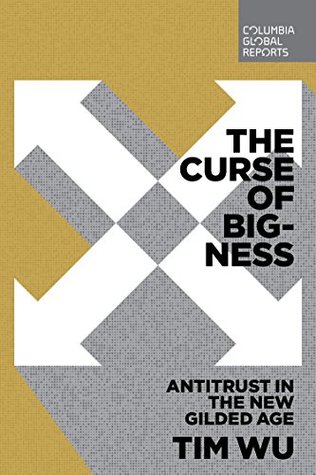More on this book
Community
Kindle Notes & Highlights
by
Tim Wu
Read between
November 3 - November 5, 2021
What we must realize is that, once again, we face what Louis Brandeis called the “Curse of Bigness,” which, as he warned, represents a profound threat to democracy itself. What else can one say about a time when we simply accept that industry will have far greater influence over elections and lawmaking than mere citizens?
This helps explain why the overwhelming majority of Americans want universal healthcare but Congress will not support it. Lobbyists line the halls of Congress daily while the average citizen goes to work, cleans the house, mows the lawn, and takes care of the kids. Representative democracy fails to represent the public.
For roughly a century, the antitrust law served in practice and theory as an antimonopoly code that sought to limit excessive industrial concentration and to police monopoly conduct.
Over the twentieth century, nations that failed to control private power and attend to the economic needs of their citizens faced the rise of strongmen who promised their citizens a more immediate deliverance from economic woes. The rise of a paramount leader of government who partners with monopolized industry has an indelible association with fascism and authoritarianism.
Today, as in the 1910s, two essential economic facts characterize the industrialized world. The first is the reemergence of an outrageous divide between the rich and the poor. This trend is most stark in the United States, where the top 1 percent today earn 23.8 percent of the national income and control an astonishing 38.6 percent of national wealth. The
A concentrated industry can tacitly collude to prevent wage growth, yielding less for workers and more for shareholders and management, and be less competitive and more profitable, thanks to the ability to cooperate to keep prices high or jointly exclude entrants. The profits are kept by professionals, senior executives, management, or shareholders, who are wealthier. Concentrated industries can also cooperate politically to prevent redistribution or use government to protect profits.
Brandeis demanded more from the economy and democracy. For him, the very purpose of life was the building of good character and the development of self. The “ideal” of democracy, he once said, should be “the development of the individual for his own and the common good.”
If he had a unifying principle, politically and economically, it is what we have said: that concentrated power in any form is dangerous, that institutions should be built to human scale, and that society should pursue human ends.
In total, Facebook managed to string together 67 unchallenged acquisitions, which seems impressive, unless you consider that Amazon undertook 91 and Google got away with 214 (a few of which were conditioned). In this way, the tech industry became essentially composed of just a few giant trusts: Google for search and related industries, Facebook for social media, Amazon for online commerce. While competitors remained in the wings, their positions became marginalized with every passing day.
Merger control has wandered so far from Congress’s expressed intent in 1950 as to make a mockery of the democratic process.
To abandon economic analysis entirely would be implausible. But what’s needed are broader and tougher merger standards, especially when it comes to the largest, most important mergers.
One remedy is to recognize that merger review is a quasi-judicial, administrative process, and one that the public deserves to know more about. Industry comments on a major merger should be filed publicly, not in secret, and any interested member of the public should be encouraged to file comments. Finally, in major mergers, the agency, if it plans on a consent agreement, should put out its proposed remedy for meaningful public comment.
Breakups and the blocking of mergers (also known as “structural relief”) are at the historic core of the antitrust program, and should not be shied away from unduly. Breakups,
In practice, the agency would put overly consolidated industries under investigation, recommend remedies through the administrative process, and adopt them, subject to judicial review.


